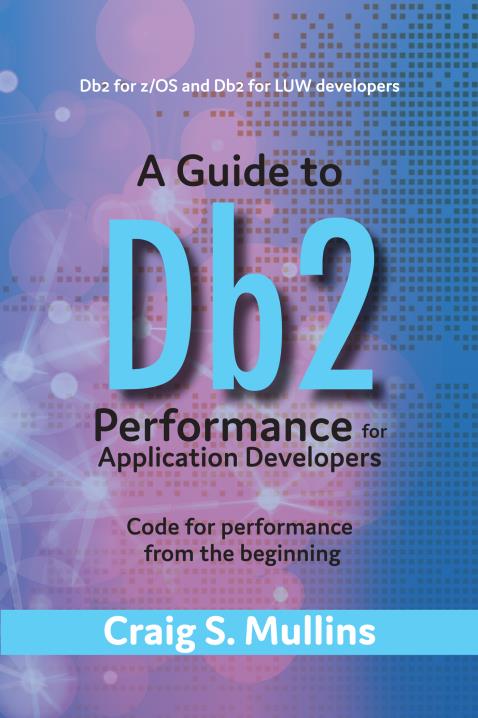A Guide to Db2 Performance for Application Developers
Feedpost Selects Data & Technology Today Top 60 Database Blog
-
Recent Posts
Archives
- January 2024
- December 2023
- November 2023
- October 2023
- August 2023
- July 2023
- June 2023
- May 2023
- March 2023
- February 2023
- January 2023
- October 2022
- August 2022
- July 2022
- June 2022
- May 2022
- April 2022
- March 2022
- February 2022
- January 2022
- December 2021
- November 2021
- October 2021
- August 2021
- July 2021
- May 2021
- March 2021
- February 2021
- January 2021
- December 2020
- November 2020
- October 2020
- September 2020
- August 2020
- July 2020
- June 2020
- May 2020
- April 2020
- March 2020
- February 2020
- January 2020
- December 2019
- November 2019
- October 2019
- September 2019
- July 2019
- June 2019
- May 2019
- April 2019
- February 2019
- January 2019
- December 2018
- November 2018
- October 2018
- September 2018
- August 2018
- July 2018
- June 2018
- May 2018
- April 2018
- March 2018
- February 2018
- January 2018
- December 2017
- November 2017
- October 2017
- September 2017
- August 2017
- July 2017
- June 2017
- April 2017
- March 2017
- February 2017
- January 2017
- December 2016
- November 2016
- October 2016
- September 2016
- August 2016
- July 2016
- June 2016
- May 2016
- April 2016
- March 2016
- February 2016
- January 2016
- December 2015
- November 2015
- October 2015
- September 2015
- August 2015
- July 2015
- June 2015
- May 2015
- April 2015
- March 2015
- February 2015
- January 2015
- December 2014
- November 2014
- October 2014
- September 2014
- August 2014
- July 2014
- June 2014
- May 2014
- April 2014
- March 2014
- February 2014
- January 2014
- December 2013
- November 2013
- October 2013
- September 2013
- August 2013
- July 2013
- June 2013
- May 2013
- April 2013
- March 2013
- February 2013
- January 2013
- December 2012
- November 2012
- October 2012
- August 2012
- July 2012
- June 2012
- May 2012
- March 2012
- February 2012
- January 2012
- December 2011
- November 2011
- October 2011
- September 2011
- August 2011
- July 2011
- June 2011
- May 2011
- April 2011
- March 2011
- February 2011
- January 2011
- December 2010
- November 2010
- October 2010
- September 2010
- August 2010
- July 2010
- June 2010
- May 2010
Categories
- AI
- analytics
- architecture
- archive
- auditing
- automation
- availability
- backup & recovery
- Big Data
- blockchain
- book review
- books
- business intelligence
- business planning
- capacity planning
- certification
- change management
- cloud
- compliance
- conferences
- contingency planning
- data
- data availability
- data breach
- data governance
- Data Growth
- data integration
- data integrity
- data management
- data modeling
- Data Quality
- data warehouse
- database design
- Database security
- DB2
- DBA
- DBMS
- DevOps
- digital transformation
- education
- EIM
- enterprise computing
- ERP
- FileMaker
- fixpacks
- free space
- functions
- Happy New Year
- History
- IBM
- IDUG
- ILM
- In-Memory
- indexing
- information
- IoT
- Isolation Level
- IT
- legacy data
- Linux
- Machine Learning
- mainframe
- maintenance
- MDM
- metadata
- Microsoft Access
- Microsoft Office
- Microsoft SQL Server
- mobile
- mugs
- MySQL
- Naming Conventions
- normalization
- NoSQL
- NULL
- OO
- open source
- operational
- optimization
- performance
- Poll
- reference data
- relational
- review
- Rules of Thumb
- salary
- SAP HANA
- scalability
- simulation
- SLA
- social influencer
- software cost
- speaking engagements
- SQL
- standards
- SysAdmin
- temporal
- Teradata
- Think
- thought leadership
- tools
- trends
- Uncategorized
- views
- Watson
- zIIP
Meta
Blogroll
- analytics availability backup & recovery Big Data book review books change management cloud compliance data data availability database design data breach Data Growth data integrity data modeling Data Quality DB2 DBA DBMS enterprise computing IBM information mainframe metadata NoSQL performance SQL standards tools
Twitter
Monthly Archives: August 2013
Top Ten Steps to Building the Right Indexes
One of the more vexing problems with relational database development is designing appropriate indexes. Perhaps the most important thing you can do to assure optimal application performance when accessing data in a relational/SQL database is to create correct indexes for … Continue reading
NoSQL Now! 2013 Conference – Day Two
The second day of the 2013 NowSQL Now conference (August 21, 2013) every bit as enjoyable as the first was yesterday. But today was more like a traditional conference, with smaller sessions instead of the half-day sessions of the first … Continue reading
Posted in Big Data, NoSQL
5 Comments
NoSQL Now! 2013 Conference
This week I am in San Jose, California for the 2013 edition of the NoSQL Now! conference. This is the third annual NoSQL Now! Conference, which bills itself as the largest vendor-neutral forum focused on NoSQL technologies. But what is NoSQL? … Continue reading
Posted in Big Data, NoSQL
9 Comments
Airport Observations
Sitting in the airport watching folks go by can be an interesting way to pass an hour or so. I had arrived early and was waiting for a colleague due to arrive on a later flight. He had rented a … Continue reading
Posted in speaking engagements, Uncategorized
2 Comments
Inside the Data Reading Room: Late Summer 2013 Edition
Hello data reader… and welcome to the latest edition of Inside the Data Reading Room. Regular readers of this blog know that Inside the Data Reading Room is a semi-regular feature of this blog with the goal of introducing and reviewing new and classic … Continue reading
Posted in Big Data, book review, books, data integration, data modeling, Data Quality
3 Comments
Top Ten Most Common Physical Database Design Mistakes
Continuing with the recent trend here in terms of posting Top Ten lists, today I offer up the Top 10 most common physical database design mistakes… Relying on the defaults – oftentimes the default settings are not optimal and can cause … Continue reading
Posted in DBA
4 Comments


